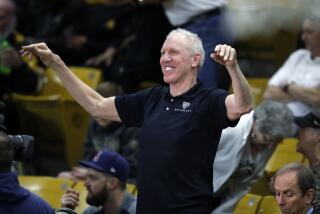Testimony: Cash Payoffs at Florida : Player Reportedly Used the Money to Buy Crack Cocaine
- Share via
GAINESVILLE, Fla. — Basketball Coach Norm Sloan, his assistant Monte Towe and University of Florida boosters gave thousands of dollars to athletes, some of it to former basketball star Vernon Maxwell, who used the money to buy cocaine, according to grand jury testimony revealed in newspaper reports Wednesday.
That testimony was included in a motion filed Tuesday on behalf of four Florida sports agents charged with defrauding the university, the IRS and the U.S. Department of Education by making secret payments to athletes during their college careers, according to a report by the Gainesville Sun and a story in the Atlanta Journal-Constitution.
Defense attorneys Donald Bierman and Hugh Culverhouse Jr. quoted Maxwell’s grand jury testimony, which normally is secret, that he went to Sloan or Towe whenever he needed money, and used some of it to buy crack cocaine during his junior and senior years.
“Any time I asked for money, you know, I could get money from them--$200, $50--whatever I asked for I could get,” Maxwell reportedly told the jury. “I don’t know who the money was coming from, but I know who was giving me the money. Monte Towe was, assistant head coach.”
The motion states that Maxwell and several former Gator football players who were given immunity from prosecution told the jury that university personnel knew about extensive drug use by athletes as well as the cash payoffs.
If the athlete’s claims prove true, Florida’s basketball and football programs could face the National Collegiate Athletic Assn.’s most severe sanction--the elimination of both programs for two years, a punishment known as the death penalty.
Sloan was on a fishing trip and did not return messages left at his home and with school athletic officials. Towe was out of town and could not be reached for comment.
“Monte Towe is an honest, hard-working basketball coach who has done nothing in violation of the law or NCAA regulations,” said Towe’s attorney, Larry Byrd of Sarasota, Fla.
According to the motion, Maxwell, who left Florida in 1988 as the school’s all-time leading scorer and now plays for the San Antonio Spurs in the National Basketball Assn., said he received $800 from Towe while still attending high school, and an additional $1,000 when he signed with Florida.
Maxwell reportedly told the jury he received about $1,000 a month from Sloan and Towe during his sophomore and junior years at the university.
The money was given him despite urine tests showing that he used marijuana as a sophomore and cocaine as a junior and senior, Maxwell reportedly testified.
Clifford Charlton, a Gator linebacker in 1987 who now plays for the Cleveland Browns, reportedly implicated then-assistant Ty Smith, saying Smith sold Charlton’s free season tickets to “boosters or fans” and gave him “around $500” in return.
According to the motion, former linebacker Ron Moten told the grand jury he received $3,000 for his season tickets after signing with the school. He also said that after he left Florida, he received money from football Coach Galen Hall through a “heavy recruiter” named Bo Bayer.
Moten reportedly testified that coaches once gave him $100 to pay for half of his girlfriend’s abortion. And he testified that he took a drug test for linebacker Alonzo Johnson, a player he said had a drug problem, while coaches looked the other way.
Moten reportedly also told the jury that teammate Tommy Duhart, a poor student who he said took the same weightlifting class five times, was dealing crack and cocaine.
Duhart, a defensive tackle from Belle Glade, Fla., was embroiled in legal hassles during his years at Florida, including assault charges and an arrest for firing a pistol at his girlfriend. He played for two seasons before being dismissed in 1986, and finished his college eligibility at Southeast Oklahoma State before a brief stint in the National Football League.
Bill Arnsparger, Florida athletic director, would not comment on the allegations.
“I really am not up to date on what you’re saying,” Arnsparger said. “I just don’t want to comment until I have been brought up to date.”
For more than a year, the U.S. attorney in Tallahassee, Fla., has been investigating possible drug use and drug sales by University of Florida athletes. The university also has been conducting an internal investigation.
More to Read
Go beyond the scoreboard
Get the latest on L.A.'s teams in the daily Sports Report newsletter.
You may occasionally receive promotional content from the Los Angeles Times.










